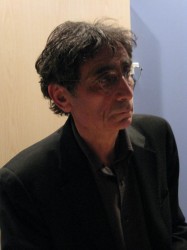[Also appearing at the same event was Dr. Samantha King, who wrote a book about the Pink Ribbon campaign and the commodification of breast cancer. She was interesting too, and I’ll try to write a separate blog post about her talk this weekend.]
Dr. Maté spent the first few minutes of his allotted time talking about breast cancer, which he believes is caused primarily by stress. He then segued gracefully from cancer into addiction by pointing out that a war on cancer makes no more sense than a war on drugs.
“You can’t have a war on drugs,” he said, “Because drugs are inanimate objects. This is a war on drug addicts.”
As such, it’s a war on the most abused and vulnerable segment of society.
According to Dr. Maté, virtually all addicts were subjected to abuse, neglect or mistreatment as children. He says he’s never had a female patient in the Downtown Eastside, for example, who had not been sexually abused as a child. Not one.
It doesn’t have to be sexual abuse, or brutal abuse or appalling levels of neglect either, to make a child vulnerable to subsequent addiction. Depressed or emotionally unavailable parents can have the same effect on their infants. (He goes into fascinating detail about this in his book, In the Realm of Hungry Ghosts.)
Essentially, failing to meet the needs of an infant or child physically alters their brain and creates physiological pathways for addiction. The brain adapts to abuse or neglect by changing.
He told us about a Toronto cop whose job it was to track down Internet pedophiles. That cop remains haunted by the videos of children crying in pain and fear – but even more so by the children who expressed nothing, who had given up, who had ‘dead eyes.’
The irony is that we feel such compassion for those dead-eyed children, but only contempt for the damaged adults they subsequently become.
“And speaking of dead eyes,” he said, “Have you ever looked at Stephen Harper’s face?”
This drew an appreciative chuckle from the crowd, but Maté wasn’t kidding. He went on to say that BC Premier Gordon Campbell used to have those same dead eyes, and he knows that Campbell’s alcoholic father committed suicide when his son was 12. He doesn’t know Harper’s history, but he suspects there’s something there too. People who were forced to experience their own vulnerability in such a traumatic way in early life will sometimes attack vulnerability in others. For politicians, this can mean stripping social programs bare, declaring war on drug addicts, and scapegoating the poorest and most vulnerable members of society.
Stephen Harper’s government has no compassion for addicts. They’re trying to shut down Insite and other harm reduction programs. They’re focusing Canada’s resources on more cops, more prisons and longer sentences. They favour punishment over treatment and ideology over evidence. It’s a phenomenally expensive approach, and it is doomed to fail here just as it is has failed in the United States. It will fail because addiction is a health problem, not a criminal justice problem. And it will fail because addiction does not surrender to punishment. Over the long run, addiction itself is hugely punitive to the addict, but it’s still self-perpetuating.
If you want to reach addicts, said Dr. Maté, you have to make things better for them, not worse. If people are to give up their addictions, it’s because they’ve had a taste of victory and like it better than defeat. They need an “island of relief.”
If you missed him this time around, Dr. Maté will be giving a workshop on April 13th for the John Howard Society in Ottawa.

















I have so much respect for Dr. Maté and what he teaches us. Thanks for this post.
I wish I had known that Dr. King was speaking. I own Pink Ribbons Inc. and share her thinking on the whole pink breast cancer crap industry. I wear a button on my bag that says, “It’s a disease not a marketing opportunity.”
Thanks for this, Zoom. Dr Maté has been one of my heros since way back.
Thank you, Zoom, for going to this event and writing about it so eloquently.